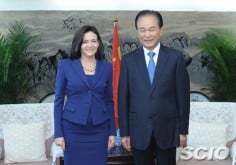
 |
|
|||||||
| Coffee Shop Talk of a non sexual Nature Visit Sam's Alfresco Heaven. Singapore's best Alfresco Coffee Experience! If you're up to your ears with all this Sex Talk and would like to take a break from it all to discuss other interesting aspects of life in Singapore, pop over and join in the fun. |
 |
|
|
Thread Tools |
|
#1
|
|||
|
|||
|
An honorable member of the Coffee Shop Has Just Posted the Following:
China to lift ban on Facebook – but only within Shanghai free-trade zone Wednesday, 25 September, 2013, 4:24pm George Chen  A general view from the top of the under-construction Shanghai Tower in Shanghai. Photo: AFP Beijing has made the landmark decision to lift a ban on internet access within the Shanghai Free-trade Zone to foreign websites considered politically sensitive by the Chinese government, including Facebook, Twitter and newspaper website The New York Times. Government sources informed of the decision told the South China Morning Post on condition of anonymity that the authority in charge of the Hong Kong-like free-trade zone in Shanghai, the first such zone on the mainland, would also welcome bids from foreign telecommunications companies for licences to provide internet services within the new special economic zone. The mainland’s three biggest telecommunications companies China Mobile, China Unicom and China Telecom, which are all state-owned enterprises, have already been informed of the decision to allow foreign companies to compete with them for business in the free-trade zone in Shanghai, said the sources. The Big Three didn’t raise complaints as they knew it was a decision endorsed by top Chinese leaders including Premier Li Keqiang, who is keen to make the free-trade zone a key proving ground for significant financial and economic reforms, the sources added. “In order to welcome foreign companies to invest and to let foreigners live and work happily in the free-trade zone, we must think about how we can make them feel like at home. If they can’t get onto Facebook or read The New York Times, they may naturally wonder how special the free-trade zone is compared with the rest of China,” said one of the government sources who declined to be named due to the highly political sensitive nature of the matter. However Beijing’s decision to open up internet access only applies to the free-trade zone and not anywhere else in the country, the sources said. In late August the State Council, China’s cabinet, approved the launch of the free-trade zone in Shanghai, which will span 28.78 square kilometres in the city’s Pudong New Area, including the Waigaoqiao duty-free zone, Yangshan deepwater port, and the international airport area. Government sources told the Post earlier this month that the free-trade zone could be eventually expanded over the next few years to include the entire Pudong district, which covers 1,210.4 square kilometres, if the first-phase launch is proved a success in helping China to restructure its economy. The government hopes the free-trade zone will attract more foreign investment and liberalise the nation’s foreign exchange and interest rate system, making capital flow much more easily.  Cai Mingzhao, head of China's State Council Information Office, meets Facebook's Chief Operating Officer Sheryl Sandberg in Beijing on Sept. 10, 2013. Photo: SCIOF Facebook and Twitter – banned on the mainland since 2009 – have played important roles in political movements in the Middle East in recent years, and Beijing is concerned about the impact of new media on social stability. Although China’s economy is now already the world’s second largest, just behind the United States, Beijing keeps tight control over the media. It blocks access to several internet websites through the Great Firewall of China, the colloquial name for the Golden Shield project which is operated by the Ministry of Public Security. Dozens of major foreign news sites including the online edition of The New York Times, which last year alleged that family members of former Chinese premier Wen Jiabao had accumulated massive wealth through secretive investments that may have involved bribery, are also currently banned on the mainland. Foreign visitors and many foreigners who reside on the mainland for work and study have complained about difficulties in accessing those news sites. Occasionally even the world’s No 1 search engine Google and its email service Gmail are unavailable. Bosses at social media networks and major media companies whose websites are banned on the mainland have lobbied Beijing for years to lift these bans. More recently, Facebook chief operating officer Sheryl Sandberg met Cai Mingzhao, the head of the State Council Information Office in Beijing, and an official photograph of the meeting was published on the Chinese government’s website, though Facebook said Sandberg’s visit to China was mainly to promote her new book. Allowing foreign telecommunications companies to compete with state-owned telecommunications enterprises is a long-awaited breakthrough that would be welcomed by several former top leaders, including former premier Zhu Rongji, but there has been little progress in the past partly due to domestic political pressure. Wen succeeded Zhu as premier, and was in turn succeeded by Li just earlier this year, in the mainland’s No 2 most powerful job after President Xi Jinping. State media has described the Shanghai Free-trade Zone, which has won direct and decisive support from Li despite open opposition from some industry regulators, just as important as Deng Xiaoping’s decision to open up the Shenzhen special economic zones to foreign investors about three decades ago. Click here to view the whole thread at www.sammyboy.com. |
| Advert Space Available |
 |
| Bookmarks |
| Thread Tools | |
|
|